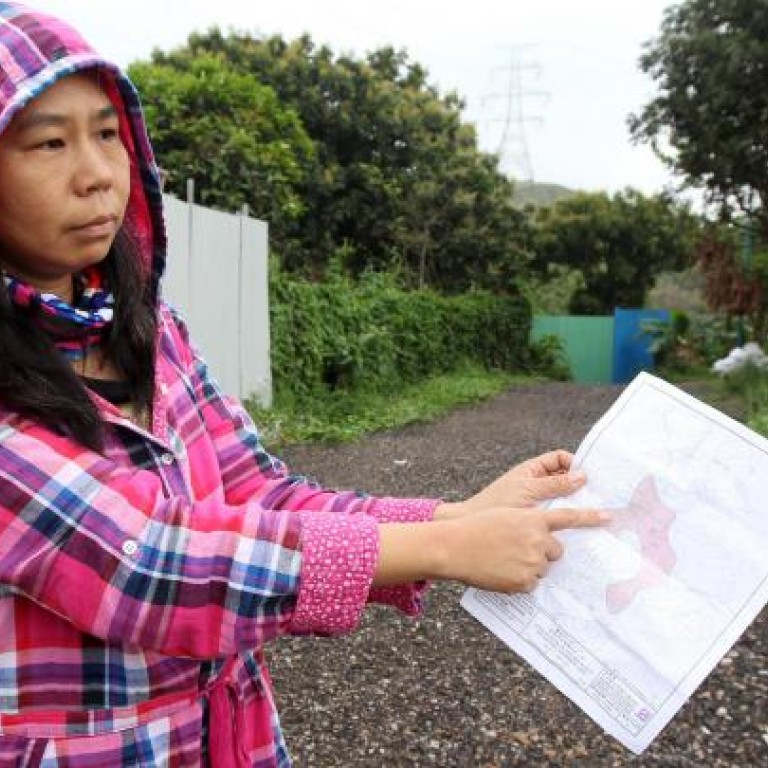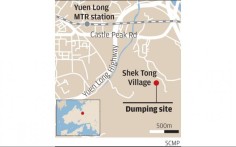
Yuen Long landlords barred from their own property
Yuen Long landlords lament being held liable for waste dumped on their property by gangster-like intruders who squat and build on the plots
For Yuen Long land owner Yeung Lai-mei, it has been an uphill task seeking justice - and at the end of it, she still has to accept injustice.
Yeung, 45, has spent the past year talking to officials, lawyers, surveyors and anyone who could help put an end to her plight.
Now, planning officials still hold her liable for illegal land-filling works committed last year, she says, by people who intruded into and even guarded her sites - private farmland that had been sitting idle.
As she finally accepts the reality - the legal responsibility for restoring the sites - Yeung complains of being thwarted in her attempts to rectify the problem.
"Even if I want to clear the mess I am not responsible for, the intruders are standing in my way," the mother of a 15-year-old daughter said.
Yeung was named the administrator of two plots of land in Shek Tong village left by her late father. But the estate has proved more a headache than a blessing.

The Planning Department has failed to identify the culprits, so it holds Yeung responsible for the violation in land use. Under the Town Planning Ordinance, land owners, on top of the people who carry out work on the land, are liable for such offences.
The police confirmed it received two reports seeking help on April 3 last year, but found no evidence of criminal offences.
The Yeung clan owns most of the land in Shek Tong, though it has become a squatters' area for non-indigenous inhabitants.
Yeung, who does not live there, has seen her fair share of the intruders' thuggish tactics.
In April last year, after she visited the place, she found herself unable to leave because one of the men had blocked the path with a car. The police were called.
"The gang hangs around at the entrance of a path leading to the village. There is also a surveillance camera. When I wander around, the men will follow and watch me closely," she said.
Yeung tried to hire surveyors to delineate the boundaries, but they turned her down after realising the complications.
Her lawyer eventually introduced her to a surveyor who had experience dealing with gangs.
"But still, the workers were forced to leave the site before they were done," she said.
Yeung said she had spent tens of thousands of dollars employing lawyers and surveyors. "We say Hong Kong is a free city, but I'm not even free to do whatever I need to on my private property."
According to the Planning Department, about 70 land owners are affected by the dumping, which covers 8,200 square metres. Some erect fences or warning signs, but the intruders remove or destroy them.
Yeung Yau says he is another victim; intruders took over his plot of more than 1,000 square feet and built a house that they have since rented out. He has been barred from the land since March last year.
He said he was unaware of the changes to his property until officials ordered him to clear out construction waste.
That was when he realised a house was being built. He issued a warning to the intruders and called the police, but they could do nothing as no criminality was involved. The house was allowed to be completed - and his land was totally fenced off.
"Where is the justice? How could someone break the law in broad daylight?" he asked.
Yeung Yau said the intruders threatened him with charges of criminal damage if he dared to touch the house or its gates.
"Police have asked us to sort out the matter by law. But it is expensive to hire a lawyer and surveyor and resume the site. Even selling off the land won't cover these costs."
Both Yeung Yau and Yeung Lai-mei said the intruders had offered to buy their land, but they refused to sell.
A third land owner said her family's site was razed without their consent and a brick house built on it and rented out.
A department spokesman said the land owners could, through legal means such as securing an injunction order, get their property back and fence it off. The department would take into account the owners' efforts at restoration when considering prosecution.
